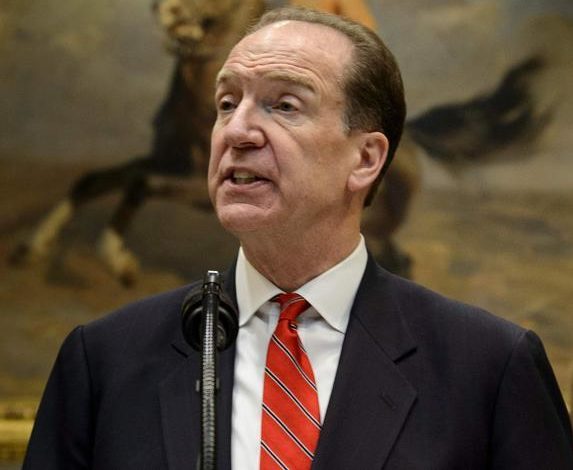
The Executive Directors of the World Bank on Friday unanimously selected David Malpass as the new President of the World Bank Group.
The new World Bank chief, whose five-year term will start on Tuesday April 9, was nominated by U.S. President Donald Trump.
A statement by the group said the Board expressed its deep gratitude to Interim President, Kristalina Georgieva, for her dedication and leadership in recent months.
The Executive Directors followed the selection process agreed in 2011.
The process included an open, transparent nomination where any national of the Bank’s membership could be proposed by any Executive Director or Governor through an Executive Director.
The process was then followed by a thorough due diligence and a comprehensive interview of Malpass by the Executive Directors.
The Board said it looked forward to working with Malpass on the implementation of the Forward Look and the capital package agreement as articulated in the Sustainable Financing for Sustainable Development Paper.
Malpass previously served as Under Secretary of the Treasury for International Affairs for the United States.
As Under Secretary, he represented the United States in international settings, including the G-7 and G-20 Deputy Finance Ministerial, World Bank-IMF Spring and Annual Meetings.
He was also represented the US in meetings of the Financial Stability Board, the Organization for Economic Cooperation and Development, and the Overseas Private Investment Corporation.
In his role as Under Secretary, Malpass played a crucial role in several major World Bank Group reforms and initiatives, including the recent capital increase for IBRD and IFC.
He was also instrumental in advancing the Debt Transparency Initiative, adopted by the World Bank and IMF, to increase public disclosure of debt and thereby reduce the frequency and severity of debt crises.
Prior to becoming Under Secretary, Malpass was an international economist and founder of a macroeconomics research firm based in New York City.
Earlier in his career, he served as the U.S. Deputy Assistant Secretary of the Treasury for Developing Nations and Deputy Assistant Secretary of State for Latin American Economic Affairs.
In these roles, he focused on an array of economic, budget, and foreign policy issues, such as the United States’ involvement in multilateral institutions, including the World Bank.
The new World Bank President has served on the boards of the Council of the Americas, Economic Club of New York, and the National Committee on US–China Relations.
He earned his bachelor’s degree from Colorado College and his MBA from the University of Denver. He undertook advanced graduate work in international economics at the School of Foreign Service at Georgetown University.